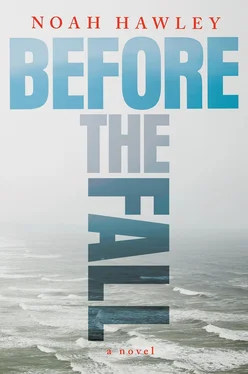“And what about King Neptune,” he says, “the long-distance swimmer?”
Namor sips his beer.
“Nothing.”
“Whaddya mean, nothing ? It’s two thousand fifteen.”
“What can I say? He’s a throwback. No cell phone, doesn’t text, pays all his bills by mail.”
“Next thing you’re gonna tell me is he’s a Trotskyite.”
“Nobody’s a Trotskyite anymore. Not even Trotsky.”
“Probably ’cause he’s been dead for fifty years.”
A waitress brings Bill a new beer. Namor signals he wants one too.
“At least,” says Bill, “tell me where this fucking Boy Scout is — on what planet.”
Namor thinks about that.
“What’s got you so bent about this guy?” he asks.
“What are you talking about?”
“I’m just saying — this swimmer — everybody else thinks he’s a hero.”
Bill makes a face like the word has made him physically sick.
“That’s like saying everything that’s wrong with the country is what makes it great.”
“Yeah, but—”
“Some failed drunk hobnobbing with men of actual accomplishment, a hitchhiker on the bootstrap express.”
“I don’t know what that—”
“He’s a fraud, I’m saying. A nobody. Muscling his way into the spotlight, playing the humble knight, when the actual heroes, the great men, are dead at the bottom of the deep blue bullshit. And if that’s what we call a hero in two thousand fifteen, then, buddy, we’re fucked.”
Namor picks his teeth. It’s no skin off his nose either way, but there’s a big ask here, a lot of laws about to be broken, so it’s probably worth being sure.
“He saved the kid,” he says.
“So what? They train dogs to wear whiskey barrels and find warm bodies in an avalanche, but you don’t see me teaching my kids to grow up to be malamutes.”
Namor thinks about that.
“Well, he didn’t go home.”
Bill stares at him. Namor smiles without teeth.
“I’m sifting through some chatter. Maybe he’ll turn up.”
“But you don’t know — is what you’re saying.”
“Yes. For once. I don’t know.”
Bill pumps his leg, suddenly uninterested in his second beer.
“I mean, what are we talking about here? A drunken degenerate? A black ops sleeper agent? Some kind of Romeo?”
“Or maybe he’s just a guy who got on the wrong plane and saved a kid.”
Bill makes a face.
“That’s the hero story. Everybody’s got the fucking hero story. It’s human interest bullshit. You can’t tell me that this dried-up has-been gets a seat on that plane just because he’s a good guy. I couldn’t even get a ride on the plane three weeks ago. Had to take the goddamn ferry.”
“And you’re definitely not a good guy.”
“Fuck you. I’m a great American. How is that not more important than what? Being nice?”
The waitress brings Namor’s second beer. He sips it.
“Here’s the thing,” he says. “Nobody stays buried forever. Sooner or later, this guy goes to the deli to buy a bagel and somebody gets a cell phone photo. Or he calls someone we’ve already tapped.”
“Like Franklin at NTSB.”
“I told you. That one’s tricky.”
“Fuck you. You said anybody. You said pick a name from the phone book.”
“Look, I can get his personal line, but not the satphone.”
“What about email?”
“In time, maybe. But we gotta be careful. They monitor everything now, since the Patriot Act.”
“Which you called amateur hour. Get some sack already.”
Namor sighs. He has his eye on the blonde, who’s texting someone while her date is in the can. Once he has her name he can fish up naked selfies in less than fifteen minutes.
“My memory is you said we had to cool it for a while,” he says. “Wasn’t that the phone call? Burn everything. Wait for my signal.”
Bill waves him off.
“That was before ISIS killed my friend.”
“Or whoever.”
Bill stands, zips his bomber.
“Look,” he says, “it’s a simple equation. Secrets plus technology equals no more secrets. What this thing needs is a brain trust, someone at twenty thousand feet who’s got access to all the intel — governmental, personal, fucking forensic weather data — and he — this elevated godhead — uses that information to paint the real picture, uncover who’s lying and who’s telling the truth.”
“And that someone is you.”
“Fucking A right,” says Bill, and walks out to his town car.
Scott sits alone that night and watches himself on television. It is less an act of narcissism and more a symptom of vertigo. To see his face onscreen, features reversed, to have childhood photos— how did they get them? — unearthed and displayed in a public forum (between commercials for adult diapers and minivans), to be told the story of his own life, as if in a game of telephone. A story that resembles his own, but isn’t. Born in the wrong hospital, attended a different elementary school, studied painting in Cleveland instead of Chicago — like looking down and seeing someone else’s shadow follow you on the street. He has a hard enough time these days knowing who he is without this sentient doppelgänger out there. This third-person him now a subject of rumor and speculation. What was he doing on that plane? Last week he was an ordinary man, anonymous. Today he is a character in a detective story. The Last Man to See the Victims Alive or Savior of the Child . Each day he plays his role, scene by scene, sitting on sofas and hard-backed chairs, answering questions from the FBI and NTSB, going over and over the details — what he remembers, what he doesn’t. And then seeing the headlines in the paper, hearing disembodied voices from the radio.
A hero. They are calling him a hero. It is not a word he can handle right now, being so far outside his own sense of himself, the narrative he has created that allows him to function — a broken man with modest ambitions, a former blackout drunk who lives moment-to-moment now, hand-to-mouth. And so he keeps his head down, dodging the cameras.
Occasionally he is recognized on the subway or walking down the street. To these people he is something more than a celebrity. Yo, you saved that kid. I heard you fought a shark, bro. Did you fight a shark? He is treated not like royalty — as if his fame is based on something rare — but more like a guy from the neighborhood who got lucky. Because what did he do really, except swim? He is one of them, a nobody who did good. And so when he is recognized, people approach smiling. They want to shake his hand, take a picture. He survived a plane crash and saved a kid. There is juju to touching him, the same boost you get from a lucky penny or a rabbit’s foot. By doing the impossible he — like Jack — proved that impossible is possible. Who wouldn’t want to rub up on that?
Scott smiles and tries to be friendly. These conversations are different from what he assumes it will feel like to talk to the press. They’re contact on a human level. And though he feels self-conscious he makes sure he is never rude. He understands that they want him to be special. It’s important to people that he be special, because we need special things in our lives. We want to believe that magic is still possible. So Scott shakes hands and accepts the hugs of random women. He asks that they not take his picture, and most respect that.
“Let’s keep this private,” he says. “It means more when it’s just you and me.”
People like this idea, that in a time of true mass media, they could have a unique experience. But not everyone. Some take his picture brazenly, as if it is their right. And others get upset when he refuses to pose for a photo with them. An older woman calls him an asshole outside Washington Square Park, and he nods and tells her she’s right. He is an asshole and he hopes she has a great day.
Читать дальше












